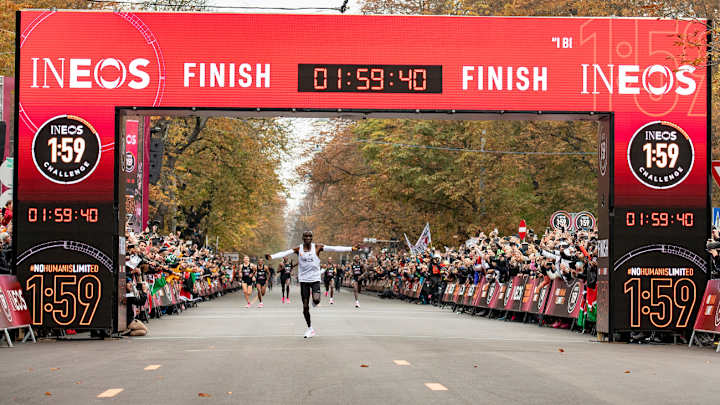Eliud Kipchoge Breaks Two-Hour Marathon Barrier in 1:59:40

On May 6, 1954, Roger Bannister became the first man to break the four-minute mile barrier. Oct. 12th, 2019 will go down in history as the day Eliud Kipchoge of Kenya became the first man to break two hours in the marathon and took down one of the last remaining barriers in athletics.
“I am feeling good,” Kipchoge said. “It has taken 65 years for a human being to make history in the sport after Roger Bannister made history in 1954. It took another 63 years, I tried and I did not get it. Now it is 65 years later, I have tried and I got it. I am the happiest man in the world to be the first human to run under two hours and I can tell people that no human is limited. I expect more people all over the world to run under two hours after today.”
Kipchoge, 34, covered the 26.2-mile distance (42.195 kilometers) in one hour, 59 minutes and 40 seconds during an exhibition attempt under optimized conditions in Vienna, Austria. This was his second attempt at making history after falling 25 seconds short in 2017 at a race staged by Nike on a Formula One course in Monza, Italy. Global manufacturing company INEOS staged the event but it is not eligible for a world record due to an alternating cast of 41 pacemakers and mobile fueling.
Kipchoge already owns the IAAF ratified world record from his 2:01:39 victory at the 2018 Berlin Marathon. He decided to bypass a regular fall marathon to test his limits in another tailored attempt on a flat 9.6-kilometer circuit along the tree-lined Hauptallee avenue intersecting the historic Prater Park. He would also be aided by advanced and unreleased Nike shoes that include a carbon-fiber plate and a few more technological advances since they were first engineered with his help in 2016.
The army of pacer setters, which included U.S. Olympic medalists Matthew Centrowitz and Bernard Lagat, helped Kipchoge click off consistent splits averaging about 2 minutes and 50 seconds per kilometer. The pacesetting car ahead of the runners was set to go at 4:34 per mile. The fastest kilometer was clocked at 2:48 and the slowest was 2:52 but still remained about nine to 10 seconds under the two-hour mark.
Just before the halfway point, it appeared that Kipchoge was slightly straining but quickly latched back onto the pacesetters, who managed to get him back on track.
With a kilometer remaining, his manager Valentijn Trouw waved off the pacers and let Kipchoge take off to the finish. He accelerated, wagged his finger to the crowd, pumped his chest twice and crossed the finish line to embrace his wife, children and coach Patrick Sang.
“I’m really excited," Sang said. "I am happy for him and for what he has achieved. He has inspired all of us that we can stretch the limits in our lives and we can achieve more than we think we can do.”
Back in 1991, Dr. Mike Joyner published a paper that said the theoretical limit of human physiology is believed to be a 1:57:58. Other experts believe that we are still possibly decades away from going under. Joyner later backtracked on his claim and said he was just hoping to see a sub-two-hour marathon in his lifetime. When Sports Illustrated re-visited his claim in 2018, he said, "If I was in Vegas. I'd put the over/under at 2028 or 2029."
The 1:59 Challenge was announced on May 6th, which set off a five-month campaign to build attention and hype around the attempt with major financial backing from British billionaire Jim Ratcliffe as well as Kipchoge’s management group, the NN Running Team. More than 660,000 people tuned in for the free YouTube live stream and thousands more are expected to have watched on other television and streaming platforms.
While many watched and were captivated, some skeptics will still say that the world is still 100 seconds away from witnessing the first sub-two in an actual sanctioned race with open conditions. In the coming weeks and months, more will be revealed and debated about the ways this attempt was engineered by science or how major companies were just pushing product.
However, Kipchoge had already shown the world that he was the greatest of all-time with his world record, eighth major marathon wins and Olympic gold medal. Sure, he benefits from all the technological advances and optimizations but beyond that his run on Saturday was less of an assurance of his talent but a gesture to inspire the world to break barriers and chase their limits.

An avid runner, Chris Chavez covers track and field, marathons and the Olympics for Sports Illustrated.